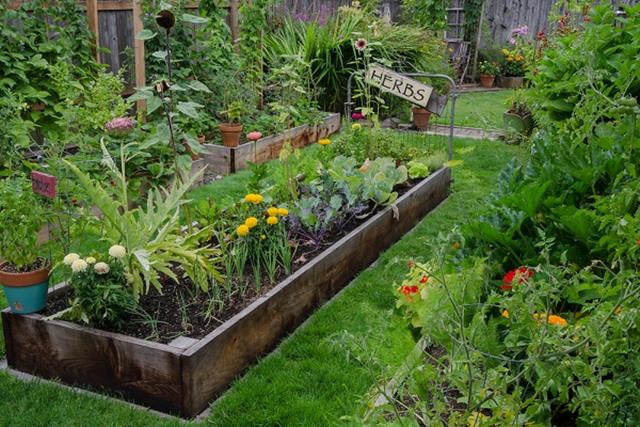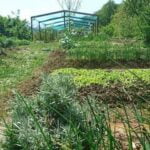Vegetable gardening is more than just a hobby or a way to grow your own food – it is an experience that brings joy and countless benefits. In this article, we will explore the various advantages of vegetable gardening, from improving health and wellness to benefiting the environment and promoting community connections. Whether you are a seasoned gardener or an aspiring one, understanding these benefits can inspire you to start your own vegetable garden and reap the rewards firsthand.
One of the most rewarding aspects of vegetable gardening is the connection to nature and the sense of accomplishment that comes from nurturing plants from seedlings to harvest. Beyond the satisfaction of growing your own food, vegetable gardening offers numerous health and wellness benefits. The physical activity involved in planting, tending, and harvesting contributes to improved physical fitness. Meanwhile, the mental well-being gained through being outdoors, connecting with nature, and engaging in a fulfilling hobby cannot be overstated.
In addition to personal health benefits, vegetable gardening also has positive effects on the environment. By growing your own produce at home, you can reduce your carbon footprint by decreasing reliance on long-distance transportation and packaging waste. Sustainable gardening practices such as composting and using organic pest control methods further contribute to environmental conservation. In a world where climate change is a pressing concern, every effort counts towards creating a more sustainable future.
Health and Wellness Benefits of Vegetable Gardening
Vegetable gardening not only provides a source of fresh, homegrown produce but also offers numerous health and wellness benefits. Engaging in this rewarding activity can have a positive impact on both physical and mental well-being.
When it comes to physical health, vegetable gardening provides an opportunity for regular physical activity. Tasks such as preparing the soil, planting, watering, weeding, and harvesting require movement and contribute to an active lifestyle. This physical exercise helps improve cardiovascular health, strength, and flexibility. Gardening also promotes better hand-eye coordination and dexterity.
In terms of mental well-being, spending time in the garden has been linked to reduced stress levels and improved mood. Gardening allows individuals to connect with nature and experience the calming effects of being outdoors. It provides a sense of purpose and accomplishment as seeds grow into healthy plants. The act of nurturing plants can also be meditative and provide a sense of mindfulness.
Additionally, vegetable gardening encourages a balanced and nutrient-rich diet. Homegrown produce is generally fresher than store-bought options since it can be picked at peak ripeness. This ensures that vegetables are at their highest nutritional value when consumed. Having easy access to a variety of vegetables also encourages individuals to try new foods, leading to a more diverse and wholesome diet.
Overall, engaging in vegetable gardening offers numerous health benefits for both the body and mind. It serves as an enjoyable form of exercise while providing access to fresh produce that can enhance one’s overall nutrition. Whether you have limited space for containers or a larger plot for raised beds, including gardening in your routine can contribute to a healthier lifestyle with long-lasting benefits.
Environmental Benefits of Vegetable Gardening
Reducing Food Miles
One of the key environmental benefits of vegetable gardening is that it helps in reducing food miles. Food miles refer to the distance that food travels from the farm to the consumer. With commercial agriculture and global food distribution systems, the average distance that our food travels has significantly increased, contributing to carbon emissions and pollution from transportation.
By growing your own vegetables, you can drastically reduce the food miles associated with your diet. The produce from your garden only needs to travel from your backyard to your kitchen, cutting down on transportation-related greenhouse gas emissions.
Preserving Biodiversity
Vegetable gardening also plays a role in preserving biodiversity. With commercial farming practices often focused on monocultures and high-yield varieties, there is a loss of diversity in our food system. By growing a wide variety of vegetables in your garden, you can contribute to the preservation of heirloom and indigenous plant species. This helps keep a diverse range of plant genetics alive and ensures that we do not rely solely on a few commercially selected varieties.
Protecting Soil Health
Another important environmental benefit of vegetable gardening is its positive impact on soil health. Commercial farming practices often involve intensive tillage, which can lead to soil erosion and nutrient depletion over time. In contrast, vegetable gardening encourages sustainable practices such as composting and organic fertilization methods that improve soil structure and promote microbial activity. Well-maintained garden soils are more resilient against heavy rainfall events and can hold more water, which reduces the risk of flooding and erosion.
Overall, vegetable gardening offers numerous environmental benefits, including reducing food miles, preserving biodiversity, and protecting soil health. By embracing this sustainable practice, individuals can contribute to a healthier planet while enjoying fresh produce right at their doorstep.
The Economic Benefits of Vegetable Gardening
Discussing the Potential Cost Savings of Growing Your Own Vegetables
One significant economic benefit of vegetable gardening is the potential cost savings it provides. By growing your own vegetables, you can significantly reduce your grocery bill and save money in the long run. Purchasing fresh produce from the supermarket can be expensive, especially when prices fluctuate based on seasonal availability and market conditions. However, by growing your own vegetables, you eliminate the need to spend money on store-bought produce.
In addition to saving money on groceries, vegetable gardening allows you to control the quality and quantity of your harvest. You can prioritize organic or pesticide-free cultivation methods, ensuring that you have a steady supply of healthy and safe vegetables for your consumption. This not only promotes better health but also saves money that would otherwise be spent on expensive organic vegetables at the store.
How Vegetable Gardening Can Be a Lucrative Side Business
Vegetable gardening has the potential to be more than just a cost-saving activity; it can also serve as a lucrative side business. If you have ample space and grow an abundance of vegetables, you can consider selling excess produce to neighbors, local farmers markets, or through community-supported agriculture (CSA) programs.
Selling your homegrown vegetables provides an opportunity for supplemental income while promoting sustainable and locally sourced food. Many individuals value fresh and organic produce and are willing to pay a premium for it. By marketing your produce as locally grown, pesticide-free, or unique varieties that are hard to find elsewhere, you can tap into this demand and generate income from your vegetable gardening endeavors.
By turning vegetable gardening into a side business, you not only contribute to your own financial well-being but also support local food systems and strengthen community connections by providing access to fresh and nutritious food options.
embracing both the practicality of reducing grocery expenses and exploring entrepreneurial opportunities
makes it evident that vegetable gardening offers significant economic benefits. Whether you choose to save money on groceries or utilize your green thumb to generate additional income, vegetable gardening provides a financially rewarding experience that enhances your overall well-being. So why not dig in, plant some seeds, and reap the economic benefits of vegetable gardening?
Community and Social Benefits of Vegetable Gardening
Vegetable gardening not only provides individuals with fresh and nutritious produce, but it also promotes a sense of community and social connection. Engaging in this activity can foster relationships with neighbors, friends, and even local organizations. The community and social benefits of vegetable gardening are widespread, enhancing our overall well-being.
One of the main ways vegetable gardening brings people together is through the sharing of excess produce. When your garden yields an abundance of crops, it presents an opportunity to share the bounty with others. Whether it’s trading vegetables with your neighbors or donating to local food banks and charities, sharing homegrown produce helps build stronger communities by ensuring everyone has access to healthy food options.
In addition to sharing harvests, vegetable gardening can be a catalyst for creating community gardens or participating in existing ones. Community gardens are shared spaces where individuals come together to cultivate their own plots or work collaboratively on communal beds.
These gardens often serve as a hub for education, workshops, and events that bring people from different backgrounds together. By working side by side in a community garden, participants have the chance to learn from one another and form meaningful connections.
Participating in community gardens also allows individuals to contribute to their neighborhoods and support sustainable practices. These gardens serve as a valuable resource for urban areas where access to green space may be limited. They enhance the beauty of neighborhoods, create gathering spots for residents, and improve overall quality of life. Moreover, tending to a shared garden fosters a sense of ownership and pride within the community, promoting positive social interactions.
Learning and Educational Benefits of Vegetable Gardening
Vegetable gardening not only provides a source of fresh produce but also offers a multitude of learning and educational benefits, especially for children. Engaging in vegetable gardening can be an excellent way to introduce kids to the wonders of nature, teach them about where their food comes from, and develop essential life skills. Additionally, vegetable gardening provides adults with opportunities for lifelong learning and personal growth.
One of the significant learning benefits of vegetable gardening is the educational value it offers to children. By involving kids in planting, tending, and harvesting their own vegetables, parents and educators can teach them about various aspects of biology, botany, and ecology. Children can learn about different plant species, their life cycles, nutrient requirements, and how they interact with insects and other animals.
Moreover, vegetable gardening fosters a sense of responsibility in children as they learn to care for plants by providing water, sunlight, and nutrients. They acquire valuable skills such as planning and organizing by deciding which vegetables to grow and when to plant them. Additionally, children can learn important life lessons about patience as they wait for their crops to grow and the importance of perseverance when facing challenges such as pests or adverse weather conditions.
While vegetable gardening offers numerous educational benefits for children, it also presents lifelong learning opportunities for adults. Gardening allows adults to continually expand their knowledge about plants, soil health, pest management techniques, composting practices, and sustainable farming methods. Whether through books, online resources, workshops or interacting with fellow gardeners at community events or farmers markets, adults can continue broadening their understanding of horticulture and environmental stewardship.
Incorporating education into vegetable gardening can be done through creative means such as maintaining a garden journal or creating a scrapbook documenting the progress of plants throughout the growing season. This documentation process offers opportunities for reflection on successes and failures while providing a visual representation of the learning journey.
| Benefit | Description |
|---|---|
| Introduction to biology, botany, and ecology | Children learn about different plant species, their life cycles, nutrient requirements, and their interactions with insects and animals. |
| Development of critical life skills | Kids learn responsibility by caring for plants, develop planning and organizing skills in choosing what vegetables to grow and when to plant them, and cultivate patience and perseverance by waiting for crops to grow and overcoming challenges like pests or adverse weather conditions. |
| Lifelong learning opportunities for adults | Gardening allows adults to continually expand their knowledge about plants, soil health, pest management techniques, composting practices, and sustainable farming methods through various educational resources. |
Stress Relief and Mental Health Benefits of Vegetable Gardening
Engaging in vegetable gardening not only improves your physical health but also provides numerous benefits for your mental well-being. The act of gardening has been proven to have stress-relieving effects and promote overall mental wellness.
One of the main reasons why vegetable gardening is beneficial for reducing stress is because it allows individuals to connect with nature and disconnect from daily pressures and anxieties. Spending time outdoors surrounded by plants, fresh air, and sunshine can have a therapeutic effect, helping to calm the mind and relax the body. Gardening requires focus and attention, which helps redirect thoughts away from stressful situations and promotes mindfulness.
Moreover, vegetable gardening can provide a sense of purpose and accomplishment, which are essential components of maintaining good mental health. As you nurture your plants from seedlings to full-grown vegetables, you develop a profound connection with nature and experience the satisfaction of watching your garden thrive. This process gives individuals a sense of responsibility and achievement, boosting self-esteem and providing a constructive outlet for emotions.
To maximize the stress-relieving benefits of vegetable gardening, consider creating a peaceful environment in your garden space. Incorporate elements such as comfortable seating areas or meditation corners where you can relax and reflect amidst the serenity of nature. Surround yourself with fragrant flowers or soothing water features to enhance relaxation. By intentionally designing your garden as a sanctuary for tranquility, you can create an oasis that cultivates peace of mind.
Physical Fitness Benefits of Vegetable Gardening
Vegetable gardening offers numerous benefits for physical fitness, providing an opportunity to engage in a variety of physical activities that promote health and well-being. From digging and planting to weeding and harvesting, the physical exertion required in vegetable gardening can lead to improved strength, endurance, and flexibility. Incorporating gardening into your exercise routine can be a fun and rewarding way to stay active.
One of the main physical fitness benefits of vegetable gardening is that it provides a full-body workout. Tasks such as digging and lifting bags of soil or compost help to build strength in your arms, shoulders, and back. Squatting or kneeling while planting seeds or harvesting vegetables engages your leg muscles, promoting muscular endurance. Additionally, frequent bending and stooping can improve flexibility in your hips, knees, and spine.
According to the Centers for Disease Control and Prevention (CDC), gardening for at least 150 minutes per week falls under the category of moderate-intensity aerobic activity. This level of activity is recommended to maintain good health and reduce the risk of chronic diseases such as heart disease and obesity. Engaging in moderate-intensity activities like vegetable gardening helps to burn calories and maintain a healthy weight.
| Physical Fitness Benefits | Description |
|---|---|
| Improved Strength | Digging, lifting bags of soil or compost |
| Muscular Endurance | Squatting or kneeling while planting, harvesting |
| Flexibility | Bending, stooping during gardening tasks |
| Calorie Burning | Moderate-intensity aerobic activity for at least 150 minutes per week |
Conclusion
Vegetable gardening is not only a popular hobby, but it also offers numerous benefits for individuals, communities, and the environment. Throughout this article, we have explored the various advantages of vegetable gardening, including its positive impact on health and wellness, the environment, economics, community and social connections, learning and education, stress relief and mental well-being, and physical fitness. These benefits highlight why it is important for individuals to embrace vegetable gardening.
First and foremost, vegetable gardening contributes to overall health and wellness. By growing your own produce at home, you have access to fresh and nutritious fruits and vegetables that are essential for a balanced diet. This promotes physical health by ensuring that you consume nutrient-rich foods free from harmful pesticides or preservatives.
Additionally, the act of gardening itself has mental health benefits as it provides a therapeutic escape from daily stressors. Gardening offers a peaceful and calming environment that can alleviate anxiety and improve overall mental well-being.
Furthermore, vegetable gardening positively impacts the environment in various ways. Through sustainable practices such as composting and water conservation techniques, gardeners reduce their carbon footprint by minimizing waste production. Additionally, growing your own food reduces the need for transportation since you are sourcing produce directly from your backyard. This diminishes greenhouse gas emissions associated with long-distance transport and supports local sustainability initiatives.
Embracing the many benefits of vegetable gardening not only improves individual well-being but also creates stronger communities. The sense of connection fostered by sharing excess produce with neighbors and friends promotes social interaction, strengthens relationships within communities, and builds a sense of camaraderie among fellow gardeners.
Furthermore, vegetable gardening presents valuable educational opportunities for both children and adults alike. Teaching children about growing their own food instills important life skills such as responsibility for the environment while providing adults with ongoing learning experiences in horticulture.
In conclusion, vegetable gardening offers an array of benefits that encompass health and wellness improvements, environmental sustainability practices, economic advantages, social connections, educational opportunities, stress relief, and physical fitness. By starting your own vegetable garden, you can experience these benefits firsthand while contributing to a healthier lifestyle and a greener planet. So why not embrace the joys of vegetable gardening and reap the many rewards it has to offer?

If you’re looking to get into vegetable gardening, or are just looking for some tips on how to make your current garden better, then you’ve come to the right place! My name is Ethel and I have been gardening for years. In this blog, I’m going to share with you some of my best tips on how to create a successful vegetable garden.





